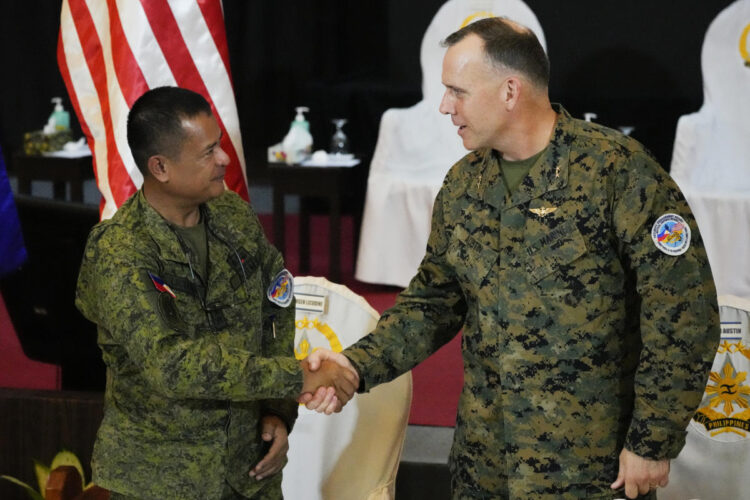MANILA, Philippines (AP) — China warned on Wednesday that a deepening security alliance between the United States and the Philippines should not harm its security and territorial interests and interfere in long-simmering territorial disputes in the South China Sea.
When asked to comment on the combat exercises between American and Filipino forces that started on Tuesday in the Philippines, the Chinese Embassy in Manila on Wednesday issued a statement by Chinese Foreign Ministry spokesperson Wang Wenbin, who said that such drills “should not target any third party and should be conducive to regional peace and stability.”
Wang did not say how China would respond if it concludes that the U.S.-Philippine security cooperation was hurting Beijing’s core interests.
In Washington, the U.S. and Philippine defense and foreign secretaries met on Tuesday to discuss the development of nine Philippine military camps, where American forces have been allowed to stay indefinitely under the 2014 Enhanced Defense Cooperation Agreement.
“These sites will support combined training exercises and interoperability between our forces to ensure that we’re even better prepared for future crises,” Defense Secretary Lloyd Austin said. He added the U.S. was allocating more than $100 million to build infrastructure at the sites, where Americans would be stationed.
China has strongly opposed that agreement, which would allow American forces to establish military staging grounds and surveillance outposts in the northern Philippines across the sea from the Taiwan Strait and in western Philippine provinces facing the disputed South China Sea, which Beijing claims virtually in its entirety on historical grounds. Washington disputes China’s claims.
Austin said he also discussed with his Philippine counterpart, Carlito Galvez, the U.S. delivery of much-needed defense equipment, including radars, unmanned aerial systems, military transport aircraft and coastal and air defense systems to Philippines over the next five to 10 years under a security assistance roadmap.
This year’s Balikatan exercises between the treaty allies are the largest since the two sides started joint military combat-readiness exercises in the early 1990s. They will run until April 28 and involve more than 17,600 American and Filipino personnel and a small Australian contingent. About a dozen countries including Japan and India but not China were sending observers, organizers said.
In a live-fire drill the allies will stage for the first time, U.S. and Filipino forces will sink a ship in Philippine territorial waters off western Zambales province on April 26 in a coordinated coastal artillery bombardment and airstrike, Col. Michael Logico, a Philippine spokesman for Balikatan, told reporters on Tuesday.
President Ferdinand Marcos Jr. has been briefed about the live-fire drill and plans to watch it, Logico said.
In Palawan, which faces the South China Sea, the exercises will involve beach assaults and retaking an island seized by enemy forces, Logico said.
Marcos, who took office in June last year, has nurtured closer relations with Washington than his predecessor, Rodrigo Duterte, who often lashed out at U.S. security policies while praising China and Russia. Duterte tried to abrogate a key defense pact that would have restrained American forces from entering the Philippines for large-scale war drills but later backpedaled from the effort.
Left-wing activists and nationalists have steadfastly opposed American military presence in the Philippines, a former U.S. colony where America remains popular among Filipinos based on independent polls.
“The Philippines is caught in an inter-imperialist conflict between the U.S. and China,” Renato Reyes of the left-wing Bayan alliance said. “We are merely being used as a footstool for American power projection and provocation in the region.”
The drills are the latest display of American firepower in Asia, as the Biden administration strengthens an arc of alliances to better counter China, including in a possible confrontation over Taiwan, an island democracy that Beijing claims as its own.
That dovetails with efforts by the Philippines under Marcos to defend its territorial interests in the South China Sea.
The ongoing drills, which started in the early 1990s, will showcase U.S. warships, fighter jets, Patriot missiles, HIMARS rocket launchers and anti-tank Javelins, according to U.S. and Philippine military officials.
[ad_2]
Source link







